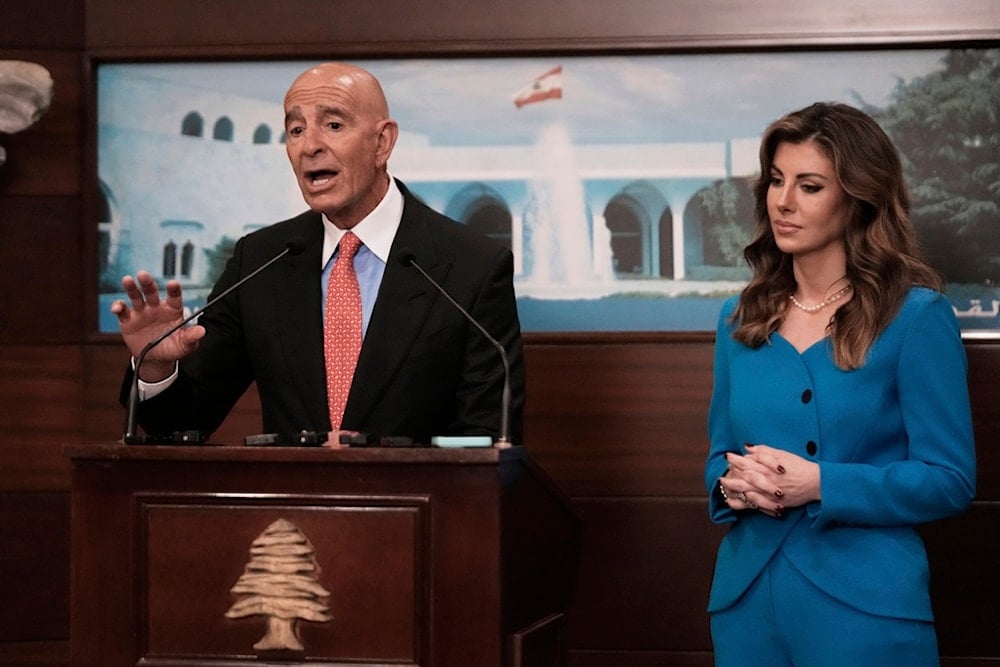US envoy Barrack calls Lebanese journalists 'animalistic"'
The Lebanese presidency expressed regret over insulting remarks at Baabda Palace but avoided naming US envoy Tom Barrack, sparking criticism.
-

US Ambassador to Turkey and Special Envoy to Syria Tom Barrack speaks during a joint press conference with US deputy special envoy for Middle East peace Morgan Ortagus at the presidential palace in Baabda, Lebanon, Tuesday, August 26, 2025 (AP)
At the start of a joint news conference with US envoy Morgan Ortagus at the presidential palace, US representative Tom Barrack lashed out at journalists present, warning them to remain quiet. He told reporters to “act civilized, act kind, act tolerant,” adding that the conference would be cut short if they did not comply.
“The moment that this starts becoming chaotic, like animalistic, we’re gone,” Barrack declared. He then questioned: “Do you think this is economically beneficial for Morgan and I to be here putting up with this insanity?”
Barrack also tied the problems of the region to the lack of "tolerance" the journalists were showing, saying, "Act civilized, act kind, act tolerant, because this is the problem with what’s happening in the region.”
The journalists did not respond on the spot, but the Lebanese Press Syndicate swiftly issued a statement denouncing what it described as the “inappropriate treatment” directed toward Lebanese journalists.
The syndicate called on Barrack and the US State Department to apologize, warning that in the absence of such an apology, it could escalate matters by urging a boycott of Barrack’s future visits and meetings.
In response to the incident, the Lebanese presidency released its own statement, expressing regret over the comments made “by one of its guests today.” However, the official communiqué noticeably avoided mentioning Barrack by name, despite the remarks clearly being his. The statement stressed the presidency’s “absolute respect for the dignity of the human person in general.”
The presidency further reiterated its “full appreciation” for all accredited journalists and media representatives, praising their efforts and dedication in fulfilling their professional and national duty.
Colonialist Remarks Spark Media Backlash in Lebanon
Barrack’s remarks carried undertones of a colonialist superiority complex, framing Lebanese journalists as unruly and “animalistic” in contrast to his call for “civilized” behavior.
By implying that the reporters lacked the discipline or refinement expected in a professional setting, he echoed a long history of Western officials adopting a patronizing stance toward local populations. Such language reduced legitimate press activity to chaos and painted the journalists as obstacles rather than dialogue partners, reinforcing a dynamic of dominance and cultural arrogance.
The comments triggered swift outrage among Lebanese journalists, who saw them as an insult to their dignity and professionalism. The Lebanese Press Syndicate’s denunciation was quickly amplified on social media, where users accused Barrack of disrespect and arrogance, with many framing his words as a blatant example of neocolonial attitudes.
The backlash online underscored widespread resentment toward foreign officials who dismiss local voices, fueling calls for accountability and even demands to boycott Barrack’s future engagements in Lebanon.
US delegation presses for Hezbollah disarmament
A US delegation met with Lebanese President General Joseph Aoun on Tuesday at Baabda Palace, affirming what they described as a "fruitful" meeting and expressing continued US support for the Lebanese people and a "secure and prosperous Lebanon."
The delegation included US envoys Tom Barrack and Morgan Ortagus, Congresswoman Jeanne Shaheen, and Senator Lindsey Graham.
In statements following the meeting, Barrack said the Lebanese government will present a plan to disarm Hezbollah by August 31, while "Israel” is expected to respond step by step. "No one wants internal fighting in Lebanon," he said, adding, "We are trying to ensure that the anti-Israel party is unarmed."
Barrack stated that the US will remain engaged in Lebanon, suggesting the creation of a new economic zone and emphasizing that all regional concerns, from "Israel” and Syria, must be addressed. He also claimed Syrian President Ahmad al-Sharaa "has no interest in a hostile relationship with Lebanon.”
It is noteworthy that "Israel" has violated the ceasefire agreement with Lebanon on a daily basis since it was first implemented late last year, and has moved to occupy Lebanese territory in South Lebanon and executed strikes on Lebanese civilians and homes.
Lebanese cabinet aligns with US disarmament framework
The Lebanese government had already begun aligning its security agenda with the US position. On August 5, Prime Minister Nawaf Salam announced that the Lebanese Army had been tasked with preparing an arms control plan to ensure state monopoly over weapons.
The plan is expected to be submitted to the Cabinet by August 31.
The Council of Ministers approved the overarching goals outlined in the US envoy’s proposal during its session on August 7. However, Information Minister Paul Morcos clarified that specific details would be discussed only after the Lebanese Army submits its implementation roadmap.
Meanwhile, sources informed Al Mayadeen that Parliament Speaker Nabih Berri insists on two key conditions: extending UNIFIL’s mandate and ensuring "Israel’s" full commitment to UN Security Council Resolution 1701.
These steps, Berri believes, are necessary precursors to advancing negotiations, securing a sustained ceasefire, achieving the withdrawal of Israeli forces from Lebanese territory, returning Lebanese prisoners from "Israeli" jails, and beginning reconstruction.

 5 Min Read
5 Min Read










